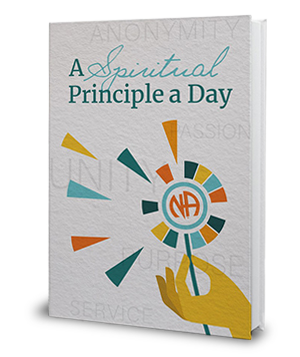Welcome to Narcotics Anonymous of NJ. Our Message Is…
That an addict, any addict can stop using drugs,
lose the desire to use, and find a new way to live.
Helpline
If you feel you have a problem with drugs, call our helpline
Events
See upcoming NA events and activities in NJ
Narcotics Anonymous is a nonprofit fellowship or society of men and women for whom drugs had become a major problem. We are recovering addicts who meet regularly to help each other stay clean.
– Narcotics Anonymous Basic Text, page 9
Recovery from addiction is possible and available through the 12 Steps and 12 Traditions of Narcotics Anonymous.
Narcotics Anonymous is FREEDOM from active addiction.
Narcotics Anonymous is an international, community-based association of recovering drug addicts with over 61,000 weekly meetings in over 131 countries worldwide.

Just for Today
It's relatively easy to accept the things we like--it's the things we don't like that are hard to accept. But remaking the world and everyone in it to suit our tastes would solve nothing. After all, the idea that the world was to blame for all our problems was the attitude that kept us using--and that attitude nearly killed us.
In the course of working the steps, we begin to ask ourselves hard questions about the roles we ourselves have played in creating the unacceptable lives we've lived. In most cases, we've found that what needed changing was our own attitude and our own actions, not the people, places, and things around us.
In recovery, we pray for wisdom to know the difference between what can and can't be changed. Then, once we see the truth of our situation, we pray for the willingness to change ourselves.
A Spiritual Principal a Day
As far as spiritual principles go, joy is uncomplicated. It can be elusive, however. In active addiction, joy was an abstract concept often far removed from our reality. How can we position ourselves to experience it now? One addict wrote, "Recovery from addiction is our path toward joy. I invite it in by removing barriers to that path, like anxiety, fear, and self-obsession." Another wrote, "Joy is the result of my commitment to gratitude, service, and simplicity. I never thought I could appreciate ordinary things." A third wrote, "The greatest joy is bittersweet because I have experienced moments of it during my darkest hours. I can't have joy without hope, and no amount of pain can take it away from me."
Experiencing pain is part of our human condition, even when we do everything right. We can get clean, own our part in our past mistakes, make amends, learn to live by spiritual principles, be of magnificent service in the rooms, at home, and out in the community--yet pain will visit us again. We'll lose people and relationships. Material gains come and go. Our health may decline. But can joy be taken from us? Is joy--like pain--an inevitable part of our experience?
Most of us would say that joy, like recovery, is available to us all. Despite our struggles, when we infuse our situation with gratitude, we find hope for our future--and create a place for joy at the table. We can choose to look at our troubles with a sense of humor and maybe even benefit from some laughter through our tears of anger or sorrow. None of this is easy. But through the inside job that is recovery, acceptance of this very moment is within reach. Serenity is possible. We can endure loss and reclaim joy over and over.

